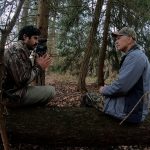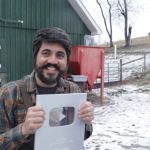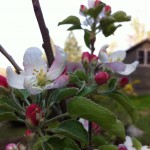The Most Important Thing in becoming a future beekeeper is to have a fascination with bees.
In this episode of Honesteady, we meet Beekeeper or “beek” Dane Strickland of RJS Beefarm. Dane is truly fascinated with bees. Dane was introduced to the power of bees when severe asthma symptoms prompted his children’s pediatrician to suggest a daily spoonful of dark honey as a remedy for the allergies triggering his son’s asthma attacks. When his son showed improvement on his dark honey regimine, Dane dove into research to understand how honey could be responsible.
Personal Fulfillment. Satisfying Curisoty. All good reasons to get into beekeeping. But of course, let’s not forget…HONEY.
Dane tells us that honey is a syrup generated 100% by the bees. It is primarily nectar from living plants. Dane is committed to chemical-free beekeeping. This means that his honey is all-natural, only composed of the nectar made by his bees from what they consume in their natural environent.
The health benefits from natural honey come from the small amounts of natural pollen particles found in minimally filtered honey. This is why some people do experience desensitization from their allergies when ingesting local dark honey.
While the benefits of local honey has been found to benefit some people in treatment of their allergies, this information is certainly not to be taken as or in lieu of advice from your medical professional.
Dane himself shares that his son experienced relief from this remedy; his daughter did not experience great results.
There is a big difference between processed honey and local honey.
Dane enlightens us to the fact that commercially processed honey uses pumps and filters in order to produce a product with “flow” for commercial container. This is why your favorite honey bear shaped bottle is able to pour a smooth stream through the spout. Consumers mistakenly believe that sugar crystals signal honey that has “gone bad.”
Local, raw honey retains the original enzymes from the nectar produced by the bees. The commercial process of heating the honey to 160 degrees kills the enzymes and dissipates the flavor. The main difference between local honey and commercial honey is that different colors, flavors, and textures between hives. These changes are made by the differences in the bees’ diet. The district, intense flavors of local raw honey is what has made honey a preferred sweetener for centuries.
Each jar of local honey tells a story about the bees who made it, and beekeepers who are supporting the bees.
Dane alerts us to the fact that our bee population is in danger. Bees are credited with 22-25% of the pollination of plants that produce our food supply. Even if you don’t see yourself as a beekeeper, you can choose to maintain your outdoor space in a bee-friendly way, by avoiding chemicals and pesticides that are harmful to bees.
Now, do you want to become a beekeeper?
Dane lets us in on the three essentials to becoming a beekeeper: a beehive, tools and protective gear, and of course, BEES! Dane also shares start-up cost estimates, and sets realistic expectations for a beginning beekeeper. In three years, Dane thinks you can break even on the initial investment by selling honey!
Making your own honey and keeping bees is deeply satisfying, which is important to the Homesteady idealist…but do the dollars make sense to Accountant Mike?
Accountant Mike takes everything into account and breaks down the numbers- stings, time spent tending the hive, and time spent making honey. Does it get a financial thumbs-up, or does fascination with bees have to be its own reward?
Need a little more information on beekeeping before you take the plunge?
Homesteady Pioneers have access to a Pioneer-Only Intro to Beekeeping podcast! Not a Pioneer? Join here!
Want to start your own honey business? (Or any other business?) Get on the early warning list for the next Homesteady Launchpad Business Course, and get your own thumbs up or thumbs down, along with practical tips and know-how from Aust and Accountant Mike.
A shout out to Terry Girard, our featured Homesteady Pioneer.
From the Suburban Escapee- Find Local Honey Near You
I’ve been a local honey junkie for several years. I buy my honey in mason jars from a small local store in the Country Boy’s hometown. It’s so thick it’s spreadable, as opposed to pourable, and if I want to blend it in a recipe, I have to heat it until it’s a liquid. According to Sally at The Country Store, it comes from hives a local resident keeps in her backyard.
Recently, I made my mom a cup of tea at my house. “Want anything in your tea?” I asked her. “Honey would be great,” she said. She watched with interest as I pried the partially stuck cover off my mason jar and spooned a solid scoop into her tea. As she took a tentative sip, her eyes opened wide. “This is amazing!” she exclaimed, “Where did you get this honey?”
My mom was gifted her own sticky mason jar soon thereafter.
But where can YOU find this richness? As Dane suggests in the podcast, there are several excellent online resources to help you track down local honey in your area. Dane has an extremely thorough website for his business, RJS Bee Farm, and has an entire “useful links” page. At honey.com, you can access a “honey locator” which will direct you to some local producers in your area. This website also has many different resources for finding out more about bees.
Want to contact local beekeepers, but don’t know where to start? Here, the Apiary Inspectors of America list national, regional, and state by state listings of beekeeping associations. I found out that my county even has a beekeeping school! It lists the contacts for local beekeepers near you, most of whom, I am sure, would be more than happy to assist you on your honey search, or help point you in the right direction to start your own hive.
Personally, I’m not afraid of honeybees. My the eaves of my house, year after year, is home a particularly nasty group of hornets. While I do my best to avoid them, while simultaneously also avoiding pesticides (I’ve had moderate luck with peppermint essential oil) I have never been intimidated by the honey bees I find serenely pollinating my garden each summer. I would like to have my own hive, someday, I think. Now I have all the resources I need to figure out if bees are right for me.
Are bees right for you? Did Dane miss any finer points of beekeeping you’d like to share? Tell us in the comments!



Just got done listening to the bee podcast and I think you left out some important streams of income for beekeepers. Here is what you and your account left out
1. Selling Bees- currently the price per nuc is @ $150. This opportunity could be made every year per hive. Instead of having your hive swarm, split the hive and let them make a queen and sell them as a nuc.
2. Removing Hives- I just started this year removing bee hives that have made a home in peoples home. Currently I’m not charging because I would like to see how it goes, but my market research shows that they are charging from $350-$800 for just removing the hive. Then you can sell that hive for $150.
Granted this is seasonal work but I think this could change beekeeping to a thumbs up.
Never giving up on the Bees
Travis
Great additional ideas Travis! Sounds good to me.
Hi Aust, I just recently found Homesteady, and I am working my way through the podcast episodes from the beginning. I really enjoy it, especially the evaluations of time/investment. I am an engineer, and very efficiency oriented. Mike reminds me of myself a whole bunch, which is fun for me to listen to.
One thing I found interesting about the beekeeping evaluation (and laying hens too) was that synergy was not taken into account. For example, my wife and I are currently shopping for a site to start a homestead and one of the things that I would like to do is grow a lot of fruit trees. Bees would not only produce honey, but also pollinate my fruit trees. In the laying hen example, you get free fertilizer for your garden/pasture.
I definitely get the idea of compartmentalizing each endeavor, since many might not be able to make use of the synergies, but I think it means that it is more worthwhile for some than for others (especially considering different markets bring different values for local honey).
I also want to mention that I have a lot of admiration for you for putting together a high quality podcast and youtube channel and for remaining positive and not getting caught up on internet negativity. And all of that in addition to running a homestead.
Keep up the good work and good luck in Pennsylvania!
Shane